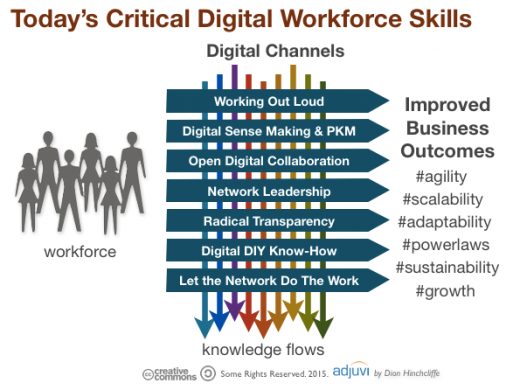digital workforce skills — from jarche.com by Harold Jarche
Excerpt:
Behaviour change comes through small, but consistent, changes in practice. So how do we move from responsibility, to creativity, and potentially to innovation? Play, explore, and converse. But first we need to build a space to practice. This is where management plays a key role: providing the space to ‘Do it Yourself’.
Our employer-employee marriages need counseling — from forbes.com by Dov Seidman
Excerpt (emphasis DSC):
Our Big Asks of employees have become so pervasive that they’re transforming into competencies. A report by Palo Alto-based non-profit research firm Institute for the Future identifies 10 increasingly important work skills. These include talents like: The ability to critically assess and develop content that uses new media forms, and to leverage these media for persuasive communication; cross-cultural competency; proficiency at thinking and coming up with solutions and responses beyond that which is rote or rules-based; and the ability to translate vast amounts of data into abstract concepts and to understand data-based reasoning.
Andrew McAfee: The Second Machine Age is approaching. Here’s how we can prepare. — from huffingtonpost.com by Dawn Nakagawa , EVP, Berggruen Institute
Excerpt:
Nakagawa: Inequality is already a problem. How much worse will inequality get in this new future?
McAfee: The stratospheric wealth of the 1 percent presents some challenges. But I think it’s largely a distraction from the more important challenge, which is not about the people at the top pulling away. It is about the 50th-percentile worker or the 25th-percentile worker. It is about the stagnation in the prospects and earnings of the middle class. We need to focus on how to improve the prospects for the middle and the bottom, people who are finding themselves stagnating or sliding backwards. It could well be that higher marginal tax rates on top levels of income and wealth are part of the solution, but we need to broaden the conversation to look for comprehensive solutions to a complex problem.
…
Nakagawa: How do we need to change the education system, not to address the labor force skills gap we see today but to prepare our younger generation for the economy that is coming?
McAfee: Our education system is in need of an overhaul. It is frustrating that our primary education system is doing a pretty good job at turning out the kinds of workers we needed 50 years ago. Basic skills, the ability to follow instructions, execute defined tasks with some level of consistency and reliability. Machines can do all those things better than we can. What they can’t do, at least not yet, are things like negotiate, provide loving and compassionate care, motivate a team of people, design a great experience, realize what people want or need, figure out the next problem to work on and how to solve it and so on. And not all the items on that list require advanced degrees. We’re going to need people with all kinds of skills and training for some time to come, so let’s rethink our education system so that it provides the required variety.









